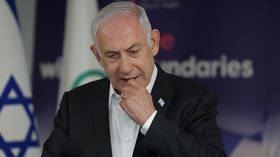Israel suspends meetings with EU after Brussels’ move to label settlement products

Israel is to temporarily suspend several meetings with European counterparts in protest of the decision to label goods that come from Jewish settlements in the West Bank. Israeli Foreign Ministry denounced the labeling initiative as “discriminatory.”
“Because of the latest EU decision, Israel is suspending its diplomatic dialogue with the EU in various forums which had been scheduled to take place in the coming weeks," the Foreign Ministry said in a statement. This will concern discussions on political issues in the Middle East, human rights and international organizations.
Deputy Foreign Minister Tzipi Hotovely added the response is to be regarded “a very strong message” to its European partners.
“We say you can't be involved in what is going on in the Middle East while you are taking such an extreme step of labeling products... boycotting us,” Hotovely stressed, as quoted by AP.
Earlier on Wednesday the Israeli Foreign Ministry issued a harshly-worded official statement concerning the EU’s decision.
Israel condemns that “the EU has chosen, for political reasons, to take such an exceptional and discriminatory step, inspired by the boycott movement, particularly at this time, when Israel is confronting a wave of terrorism targeting any and all of its citizens,” the statement reads.
The statement also reproached Brussels that “there are over 200 other territorial disputes worldwide, including those occurring within the EU or on its doorstep” adding that the labeling policy “may also have implications for Israel-EU relations.”
On Tuesday, the Foreign Ministry summoned the European Union’s ambassador to Israel, Lars Faaborg, to explain the decision, reported the Jerusalem Post.
The official EU position is that all territories taken by Israel in 1967 – including East Jerusalem, Golan Heights and the West Bank – are occupied and therefore not part of Israel, implying that products originating from there cannot be marked as ‘Made in Israel.’ On Wednesday the EU provided legal guidelines explaining how to handle such goods coming from territories not part of Israel in 1967.
READ MORE: Israel legalizes 800 homes in W. Bank settlements, says homes aren’t new
Israeli politicians widely condemned the labeling move as anti-Israeli.
Justice Minister Ayelet Shaked called the decision 'anti-Israel and anti-Jewish,’ and said she plans to look into possible legal action against the EU, Jerusalem Post reported. ‘The European hypocrisy and their hatred of Israel has crossed every line,’ she stated. ‘It's interesting that they do not label products from the Western Sahara or [northern] Cyprus.’
However, former FM and now member of the Knesset Tzipi Livni doubted the EU’s decision would have such disastrous outcomes as expected. She noted it is up to every single European country to adopt it or not. “Israel must go from country to country and convince them not to adopt the decision,” she said, as quoted by the Post. “In order for that to happen, we need the right policy. We must say the prime minister's policy is really two states, and prove it, so they will understand there is no reason to push us into a corner.”
Since the labeling issue first emerged in 2012, the EU has attempted to downplay it as a technical and not a political matter. Brussels has insisted it does not imply a boycott of Israel, but rather a solution to inform consumers where these products originally come from.
The disputed territories have been under Israeli control since the 1967 Six-Day War between Israel and neighboring Arab countries. UN Resolution 242 demands the withdrawal of Israeli armed forces from the territories occupied in the conflict. Israel disagrees with the wording of the resolution, and says the territories are in dispute.
READ MORE: Jews only: Arabs facing discrimination in Israeli property market














